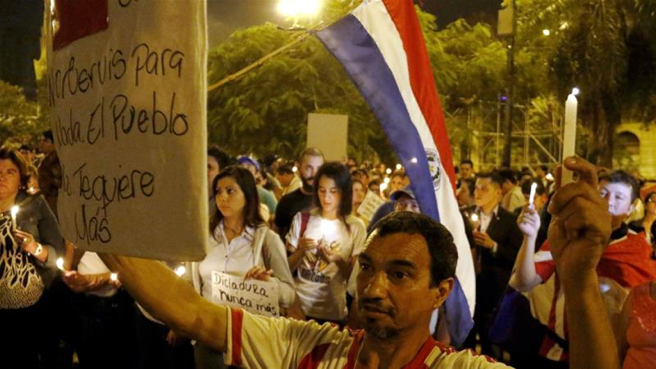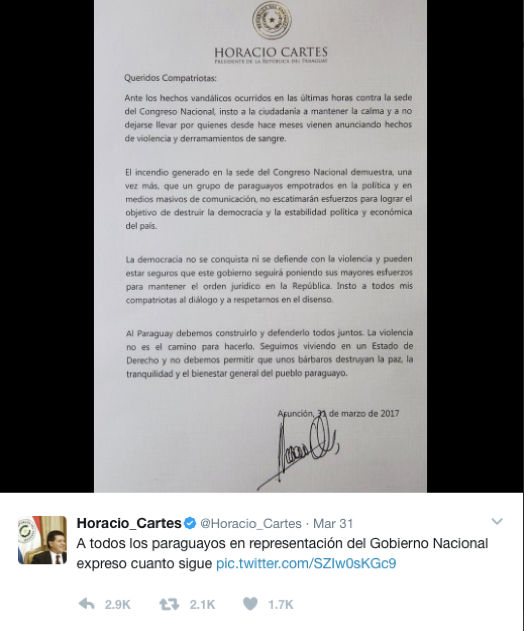Dictatorship and socio-economic bias have left Latin America home to some of the most corrupt nations in the world. Despite the continent’s recent relative success in economic development and securing regional trade agreements, 20th century political scourges still haunt many Latin American nations and Paraguay is no exception. For 35 years the nation endured a period in which popular peaceful dissent was met with the strong-arm of the military. Extralegal arrests and humans rights abuses were commonplace, and the housing of Nazi war criminals was an accepted practice. Paraguayan President Horatio Cartes’ renewed bid last week for re-election risks forfeiting the strides made towards real democracy over the past decade and may force the government back into political crisis.
While Paraguay’s political future remains in doubt, the facts surrounding the events of the 31 March are not in dispute. A majority group from the Senate and a hand-full of opposition senators met secretly to cast a majority vote to put into motion the first steps necessary to amend the Paraguayan constitution. The amendment would enable President Cartes to seek a second term in contravention of the single-term limit originally imposed to bolster Paraguay’s democratic processes. The proposition could further entrench Cartes’ Colorado Party that has enjoyed a majority in the legislature for 66 of the last 70 years. After 35 years of despotic rule by dictator Alfredo Stroessner, the people of Paraguay were outraged by this legislative “coup d’etat” which sparked a protest at the Congressional building in Asunción.
In the melee that followed, a large portion of the building was gutted by fire and Rodrigo Quintana, the leader of the Liberal Party’s youth branch, had been shot dead. The details surrounding the incident are dubious, if not damning. Quintana was shot and killed in a violent police raid on the Liberal Party’s Youth Branch political headquarters. Security footage shows Quintana running away from the police. After absorbing the deadly shot, an officer now identified as agent Gustavo Florentin approached and stepped on his body. Florentin has since been fired, along with the interior minister and Paraguay’s police commander, Crispulo Sotelo. While these dismissals direct blame towards the police for an inability to protect Congress and the public, the truth is this action by President Cartes was more preventative than altruistic. The calculated move precludes the possible violent reaction from an already agitated opposition but the risk of repeated violence endures until negotiations surrounding the amendment begin and until transparent government investigation of the police raid lifts the perception of impunity.

A Vote Against Confidence
The Colorado party will likely argue that the vote was an inadvertent procedural violation of legislative etiquette. The opposition, along with the neighbors and trade partners, will view the covert legislative action as a power grab and a sure indicator that a corrupt polity is leading the small land-locked country backward in already uncertain economic times. A procedural violation can be dealt with within the democratic process, but a substantive and willful disregard for democratic governance spells a disastrous outcome.
To understand the level of risk being taken and the importance of the upcoming events, one needs only to look at who responds and what is said. Immediately after the violence, President Cartes downplayed the events in a letter to the people of Paraguay. In the third paragraph he writes: “Democracy is not conquered or defended with violence and you can be sure this government will continue to put its best effort into maintaining order in the republic…we must not allow a few barbarians to destroy the peace, tranquility and general well-being of the Paraguayan people.” His cavalier statement was met with disdain by the United Nations Office of the High Commissioner for Human Rights (OHCHR), which quickly issued a pointed cautionary statement calling on political leaders “to avoid inciting violence and seek dialogue.” Although innocuous at first glance, the OHCHR statement avoids addressing the protestors or their actions and instead directly engages political leaders for “inciting violence”.

The Paraguayan Congress remains shut down while fire inspectors assess the damage. With a populace fighting widespread corruption of government officials, broken promises for rebuilt infrastructure, and frustration over lack of progress, even Asuncion’s own mayoral race was lost to the opposition party. Pope Francis of neighboring Argentina has called for immediate dialogue between opposing parties and President Cartes has heeded the advice, recommending to the lower house (presumably pro-amendment) to delay until the factions could discuss a way forward for the initiative. Opposition leader Efrain Alegre objected, pending a comprehensive investigation into the events surrounding Quintana’s death. The bipartisan call to delay the vote, originally scheduled for April 4th, further obscures the path forward and and tensions continue to rise. Further delay could unravel an uneasy peace maintained since Cartes assumed the Presidency in 2013.
Despite all evidence pointing to the impossibility of withdrawing the proposal and annulling the clandestine senate vote, there is still a chance that diplomacy and influence from neighboring countries could prevail. Since President Cartes’ election, Paraguay has experienced a surge in economic growth, making it one of South America’s fastest growing economies. This glimmer of hope would lead one to believe that the Colorado party should abandon the measure and seek a strong replacement for Cartes in 2018, restoring peace and trust in a nation still racked with fear of a return to despotism. The unfortunate truth is that the prospect of political gain and notoriety is alluring, and the risk to the political certainty of the country is high. The most promising course of action towards maintaining peace would be for Cartes to go against the majority, adhere to the current constitution, and eliminate himself as a candidate in the next election. This also appears the most unlikely scenario, as it would put an end to the right-wing preeminence that the Coloradan majority has enjoyed for decades.
Point of Inflection
In the absence of immediate and powerful diplomatic intervention or reversal by Congress, Paraguay faces a crossroads in which violence and freedom could become interdependent. The lower house will, if allowed to vote, pass the measure and send the constitutional amendment to the President for approval. If the recent violence following the initial vote is any clue to how the opposition will react, the ensuing fear and anger will undoubtedly thrust this tiny nation into a state of complete chaos. The ingredients exist for a violent implosion: a new police commander, a new interior minister, complete right-wing control without term limits, and a populace that has tasted freedom and democracy even if only for a brief period of time.
The upcoming weeks are crucial for determining the future prospect of peace and economic growth, both for Paraguay and for greater Latin America. Absent any legislative reversal on the initiative, the nation is on a collision course. The tragic and too-familiar possibility of a counter-revolutionary dictator rising from the ashes is greater now than at any point since Stroessner’s final days in 1989.
 Major Kirby “Fuel” Sanford is a U.S. Air Force F-16 Instructor Pilot with combat experience in Syria, Iraq, and Afghanistan. He is currently a master’s student in Buenos Aires, Argentina. The views expressed in this article are those of the author and do not reflect the official policy or position of the U.S. Air Force, the Department of Defense, or the U.S. Government.
Major Kirby “Fuel” Sanford is a U.S. Air Force F-16 Instructor Pilot with combat experience in Syria, Iraq, and Afghanistan. He is currently a master’s student in Buenos Aires, Argentina. The views expressed in this article are those of the author and do not reflect the official policy or position of the U.S. Air Force, the Department of Defense, or the U.S. Government.

